2007 Exchange
Alumnus finds success the old-fashioned way
Higher education key to Anheuser-Busch employee development
Randy Stoecker named 2007 Distinguished Alumnus
Pure Country Dreams – the story of Rusty Rierson
Growing entrepreneurship in city youth
Back-to-back national champs
Faculty investigate benefits/costs of NAIS
Alumni Updates
Welcome to the NAIBERhood
![]()
Greetings from the Department Head, Bryan Shurle
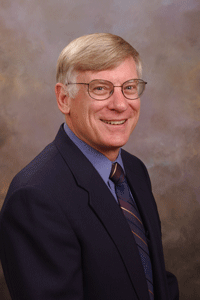 On behalf of the Department of Agricultural Economics I want to offer our sincere thanks for your continued support of our department. As a relatively new department head, I learned a lot this year, and am pleased to inform you that we have a really excellent department. Each day we work hard on the task at hand – equipping students, businesses, communities, and government to make the best decisions possible through our research, extension and teaching.
On behalf of the Department of Agricultural Economics I want to offer our sincere thanks for your continued support of our department. As a relatively new department head, I learned a lot this year, and am pleased to inform you that we have a really excellent department. Each day we work hard on the task at hand – equipping students, businesses, communities, and government to make the best decisions possible through our research, extension and teaching.
Our Agricultural Economics students, faculty and alumni continue to make us proud as you will see from our stories on the following pages. These are stories about the department which is a large community of people dedicated to excellence and improving the lives of those around us. You’ll read about our NAMA team who accomplished back-to-back wins at the national NAMA competition beating out 31 other universities; several stories of alumni who have taken their degrees to the next level by assuming industry-changing leadership to incorporate the best business practices in their operations; and news of research our faculty are conducting to offer practical solutions to some of our most pressing concerns. This past year the Masters of Agribusiness program celebrated 10 years of success, and the next class is likely to be the largest ever.
The MAB program won another award this year for an internet-based course that focuses on business and economics of food and agriculture taught by instructors from around the world. Our extension programs have been well received this past year with great attendance at our Risk and Profit conference and our Management and Strategic Thinking (MAST) program. We have hired four new people working in our Farm Management Associations, and the number of farm records analyzed this past year increased for the first time in a number of years. Our undergraduate students are leading the college in overseas experiences due to international travel courses this past year, and we have two trips planned for this coming year as well. We have many things to be proud of as we look across the department.
I’d like to offer special thanks to an alum that generously made it possible for our newsletter to not only to be printed in color, but also reach a substantially larger number of alumni by increased distribution. This gift is why some of you might be getting this letter for the first time. Like this unnamed alum, we welcome the talents and skills each of you offer to our department whether they are your time, encouragement, advice, expertise in the classroom, recruiting efforts or monetary gifts. Together, we can look forward with optimism to the challenges the future presents.
Alumnus finds success the old-fashioned way
 At a time when many farm boys leave home to find fortune elsewhere, Michael Springer has stayed put, raising his young family near Sycamore, in far southeast Kansas.
At a time when many farm boys leave home to find fortune elsewhere, Michael Springer has stayed put, raising his young family near Sycamore, in far southeast Kansas.
“Ninety-five percent of my time goes toward pig production, and I love it,” said the 29-year-old, a Kansas State graduate in agricultural economics.
Springer, his wife, Christy, and toddler son, Mason, work alongside his parents, Chuck and Debbie, and Chuck’s parents, Lee and Dorothy. Their diversified operation also includes wheat, corn, soybeans and a few cattle.
Michael Springer is becoming a leader in Kansas’ swine production. At the Kansas Pork Association meeting last month, he was elected to the KPA Executive Board. He also expressed interest in training for the National Pork Producers Council’s LEADR program.
Stepping up isn’t a surprise, said Jim Nelssen, a swine specialist at K-State and also an Executive Board member.
“He asks the right questions,” Nelssen said.
Springer has fully immersed himself in the farrow-to-finish operation, whether it is production efficiencies, animal health, personnel management or the public’s perception of the swine industry.
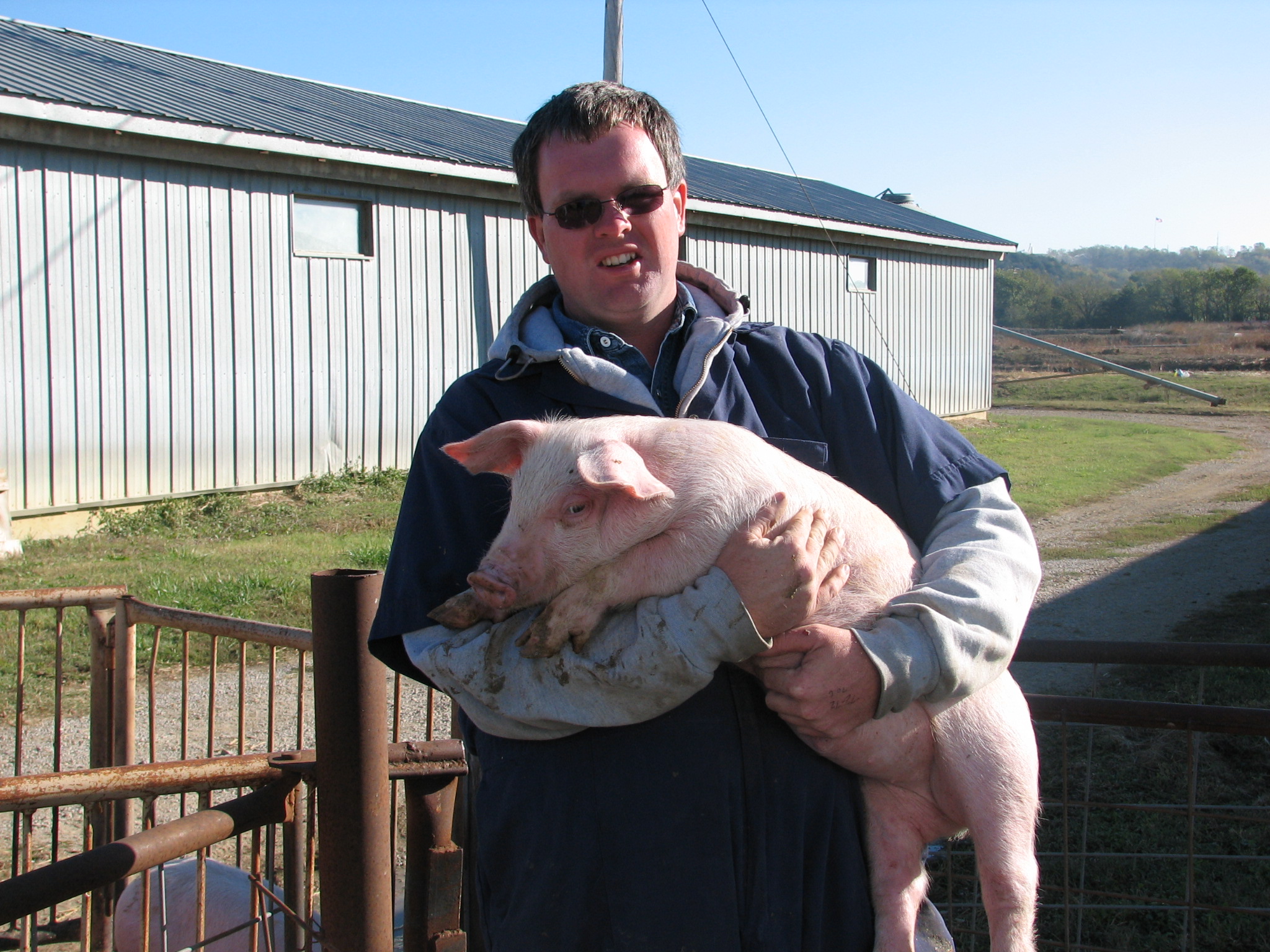 “I’m proud of what we do,” he said. “We’ve increased sales with a smaller sow herd. The real challenge for me is to make it work. It takes the cooperation of every person on the farm. The challenge is how to make myself better and the people I work with.”
“I’m proud of what we do,” he said. “We’ve increased sales with a smaller sow herd. The real challenge for me is to make it work. It takes the cooperation of every person on the farm. The challenge is how to make myself better and the people I work with.”
There are days, he said, when he can’t provide his staff with solutions to do their jobs better. “That’s an industrywide concern, but we’ll get through it,” he said.
The Springers have four pig production units, ranging 12 to 15 miles from home. Circovirus has been found in two of the units. Springer said signs showed up two years ago and diagnosis was confirmed last July.
The mortality rate in one unit doubled, from 4 percent to 8 percent. Vaccination trials and changes in their production practices have shown a mortality reduction.
Though his son isn’t yet two years old, Springer already is thinking about how the family farm can go to a fourth generation. Springer said he didn’t want to be the dad to force his son to look elsewhere.
Part of that will be to strive to produce a quality product, he said.
“There’s a gap between the extremist animal rights views and what we do in our industry,” Springer said. “There are things we can do to calm the extremists. We have to take a broader look and make changes.
“We as producers need the public to know we’re good herdsmen because we truly are. It’s my responsibility as a producer to educate. Even though we’re a small farm, to our neighbors, we’re huge.”
Higher education key to Anheuser-Busch employee development
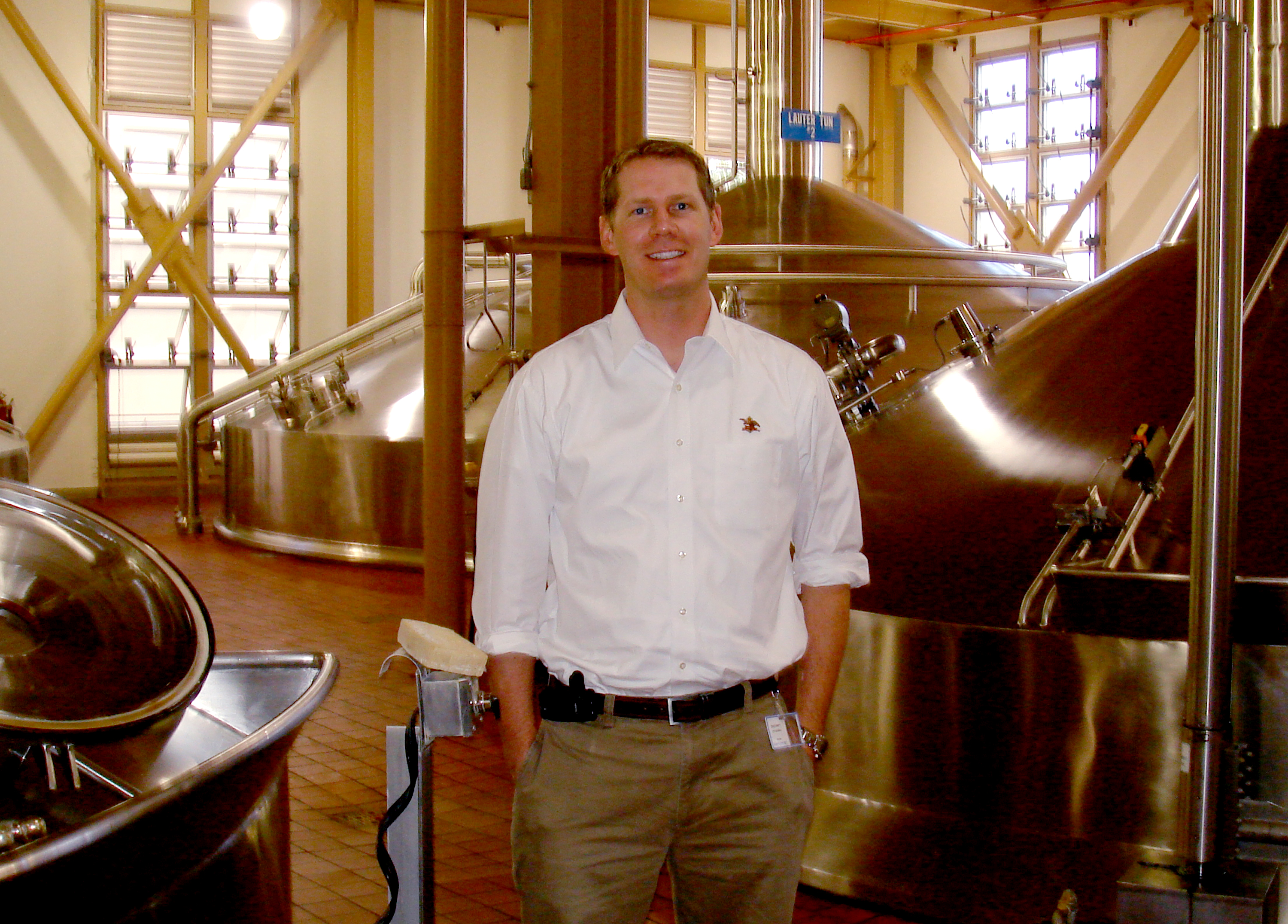 While filling a temporary position with Busch Agricultural Resources, Inc., Zach Gaines developed an interest in the beer industry and agriculture. With an undergraduate degree in English and little background in agriculture, Gaines, a Research Technician in Fort Collins, Colo., knew he needed to learn more about the industry to be successful. His answer: the Kansas State University Master of Agribusiness (MAB) distance program.
While filling a temporary position with Busch Agricultural Resources, Inc., Zach Gaines developed an interest in the beer industry and agriculture. With an undergraduate degree in English and little background in agriculture, Gaines, a Research Technician in Fort Collins, Colo., knew he needed to learn more about the industry to be successful. His answer: the Kansas State University Master of Agribusiness (MAB) distance program.
“I was a guy with a liberal arts degree working for the largest beer producer in the U.S. That was a big motivational factor in the decision to continue my education,” Gaines said.
“I wanted to learn more about the company and its role in the beer industry.”
Gaines chose the MAB program because of its agribusiness focus, the direct application of coursework to current work situations and the ability to complete a master’s degree without being on campus full time. The program has met those expectations and more. After receiving his MAB degree, Gaines was promoted to the position of Brewhouse Group Manager at the Los Angeles Brewery, Anheuser-Busch, Inc.’s second-largest brewing facility, which produces more than 12 million barrels and 19 brands of beer a year.
“The Master of Agribusiness program helped bridge a gap between where I was and where I wanted to go. The skills I learned allowed me to make the jump between research and brewing production management. It has made me a greater asset to Anheuser-Busch and I’m beginning to better understand the complex relationship between the two distinct sides of the business: raw materials and production,” Gaines said.
As a Group Manager, Gaines is responsible for front-line brewery management and oversees the day-to-day operation of the brewhouse. He also makes sure the brewhouse is stocked with adequate amounts of raw materials and analyzes data to optimize the brewery’s performance. Being able to analyze data is crucial to the entire supply chain.
“I couldn’t do my job without the knowledge I learned about spreadsheet modeling in all of my MAB courses. From evaluating breeding programs for brewing quality to analyzing and trending data to find out what is going right or wrong with our beer, solving problems by looking at numbers is a big part of what Anheuser-Busch does,” Gaines said.
Gaines’s decision to begin the MAB program was encouraged by Anheuser-Busch for several reasons. One key reason is it gives students a broad knowledge of the agricultural industry that isn’t found in a traditional MBA program.
“We’ve had other employees in the program and it has been highly beneficial for them and Anheuser-Busch. It helps create successful ‘next-level’ managers,” Tom Loch, Director of Human Resources of Anheuser-Busch, Inc., said. “The employees’ respective divisions as a whole have benefited from the perspective and skills they bring back.”
The ability to complete the program and continue working at the same time is also a big plus for both employee and employer. Since students attend class online, they do not have to take time away from work.
“Zach could do coursework online during the evenings or weekends so it didn’t impact his workday and the two-week commitment to come to campus each year didn’t cause any problems either,” Loch said.
Both agree the thesis project Gaines completed analyzing the impact of the growing popularity of microbreweries addressed an issue important to the traditional beer industry.
“Zach’s thesis about microbreweries and their affects on traditional beer was very insightful. He was able to research a current topic and put together a good piece of work that has been shared with several individuals within our company,” Loch said.
K-State’s Master of Agribusiness is an award-winning, distance-education degree program focusing on food and agribusiness management. Students in the program are located in more than 30 states within the United States and 20 countries abroad. They range in age from 25 to 55 and work in every sector of the food and agribusiness industry.
The program was the first agribusiness program in the nation to be offered through distance education. The distance education delivery breaks down barriers associated with earning a master’s degree, such as access to a university campus, job changes, relocations and job-related travel. For more information please call 785.532.4495, email mab@agecon.ksu.edu or visit our website at www.mab.ksu.edu.
![]()
Randy Stoecker named 2007 Distinguished Alumnus
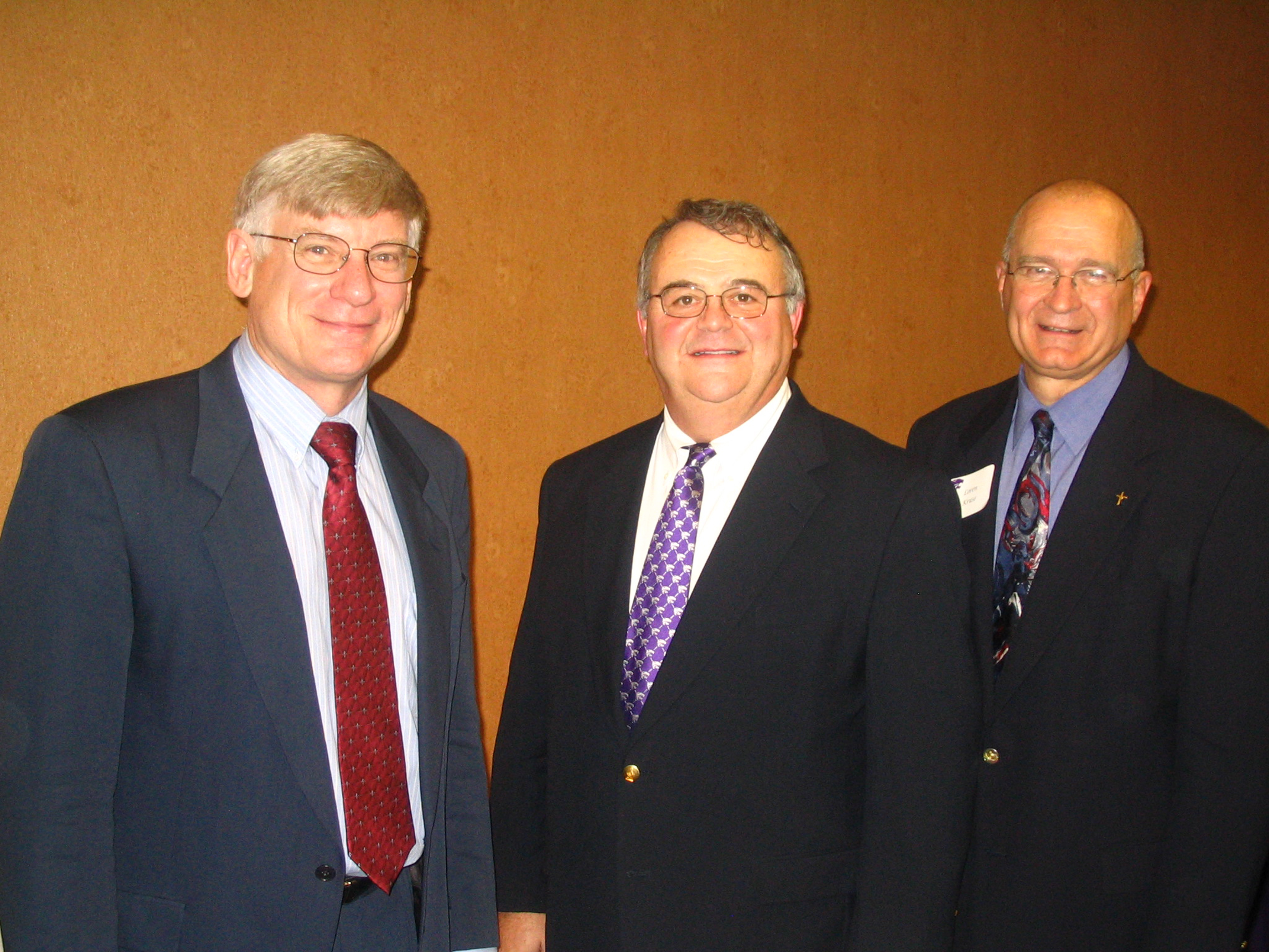 On Interstate 80, one can see for miles until Iowa’s cropland meets the clear blue at the horizon. Like this hazy line of landscape and sky, Randy Stoecker, President of Western Operations for Murphy-Brown, LLC., a division of Smithfield Foods, has spent more than 30 years looking intently at opportunities awaiting the pork industry. Leading with vision, Stoecker has helped build the largest live pork production company in the world. Throughout his career, this Ag Econ alum who overseas 3000 employees and pork production crossing nine states, has synergized his talents and strengths into success.
On Interstate 80, one can see for miles until Iowa’s cropland meets the clear blue at the horizon. Like this hazy line of landscape and sky, Randy Stoecker, President of Western Operations for Murphy-Brown, LLC., a division of Smithfield Foods, has spent more than 30 years looking intently at opportunities awaiting the pork industry. Leading with vision, Stoecker has helped build the largest live pork production company in the world. Throughout his career, this Ag Econ alum who overseas 3000 employees and pork production crossing nine states, has synergized his talents and strengths into success.
Raised the son of a hard-working, community-focused, Kansas farm family, Stoecker came to K-State in 1965 and majored in agricultural economics. His interest in farm policy quickly endeared him to a fellow Alpha Gamma Rho Fraternity pledge brother, Loren Kruse.
“We loved talking about farming, particularly in contrasting Kansas with my home state of Iowa,” Kruse said. Even then Kruse remembers Stoecker’s leadership abilities. “I’ll never forget something he told me back in college after he was elected president of Interfraternity Council: ‘If an organization is worth belonging to, it is worth being the leader of.’ ” Kruse recalled. “He loves to think big, and he challenges others to think the same way. He has many natural gifts for leadership that he has built upon through hard work.”
According to Kruse, Editor-in-Chief of Successful Farming magazine, one of Stoecker’s strengths is his great curiosity about diverse subjects.
“Randy is always learning and applying what he learns to improve. He likes to try out new ideas and new ways.” Kruse said.
Exploring and implementing innovations are a hallmark of Stoecker’s career. In the early ‘70s, after gaining experience in banking and sales, Stoecker went to work for Yeager and Sullivan, the largest pork producer in the United States at that time. He was assigned to study large scale confinement pig production in Europe.
“As I looked at the relative strength and performance of the U.S. pig industry in 1975 relative to England and northern Europe, I was convinced there was a big opportunity waiting if we could adapt the changes that normally happen with financial pressure,” Stoecker said.
In 1979 Stoecker took a position as general manager of Pig Improvement Company (PIC) focusing on breeding sows with high productivity and his innovations were noticed across the industry.
Betsy Freese, former Livestock Editor for Successful Farming, covered the industry throughout that time. “By the early ‘80s the pork industry was poised for change. The idea of moving toward large scale production was especially welcome in the east.
North Carolina was emerging as an aggressive state as far as growth in the hog industry, and I was sent to cover it,” Freese said. “They were doing some unusually aggressive things, specifically with contract production. Wendell Murphy of Murphy Farms was behind that, and it wasn’t long before he wanted Stoecker to join his team.”
In 1987 Stoecker took on production responsibilities with Murphy Farms. In ten years they grew to be the largest swine production company in the U.S.
“Murphy Farms brought Randy out from North Carolina to run their expansion in Iowa. Contract feeding at that time in Iowa was unheard of, there was a lot of controversy. He basically brought the North Carolina system of contract feeding to the Midwest and other people followed,” Freese said. “He’s the genius behind the whole system of what is going on in the Midwest concerning the contract feeding of hogs. He’s managed the whole thing.”
In 2000 Murphy Farms was acquired by Smithfield. Stoecker was asked to lead the Western Operations, his current responsibility.
Freese recalls, “The scope and scale of the industry changed rapidly. Surviving through that kind of rapid growth was the challenge facing businesses then. In 20 years the industry went from many small farms to 20 to 50 large farms. Smithfield going from nothing to over a million sows.”
Stoecker’s success was unsurprising to Freese. Randy’s a good judge of people, he doesn’t have much to fear. He’s not afraid to try new things, he’s respected and he’s usually right. He just has great instincts. He’s intelligent that goes without saying, Freese said.
Although respected and revered by many throughout the pork industry, Stoecker is the first to humbly credit strong values, hard work, and good people for his career success.
“There have been several ideas I’ve held onto that have guided me in my career. I really don’t believe we spend enough time early on figuring out who we are. Do we analyze our real skills and passion; looking at where the opportunities are? I’ve learned I’m a curious person, interested in the front end of things. I’ve been good at seeing opportunities early and creating enough interest and understanding of their value to have people pursue them,” Stoecker said. “I learned early in my career that once an idea was rolling I lost interest in it, I was already looking for the next opportunity. So, I pursued positions where this skill would be most effective.”
Another key value Stoecker feels is important is the value of work.
“I believe learning to enjoy work is a wonderful trait that parents can pass on to children. If you have it, you need to thank those that taught it to you. If you don’t have it, you need to find it. The first step is to find something you enjoy that doesn’t feel like work. We all invest a tremendous amount of our adult lives focused on whatever we’ve chosen as a career, so it’s sad when you see someone doing something they don’t enjoy,” he said.
Stoecker regularly speaks with college students to pass on wisdom he’s learned. He encourages students to be thoughtful as they pursue their first job.
“I tell students to pick their supervisor and not the company. The first five years they’re out of college will either launch them into a career or find them stuck doing activities they don’t enjoy. If they can get excited about working for someone, and they’re convinced that person has their future in focus, they will find themselves successful,” he said.
At the end of the day, Stoecker finds the value of integrity to be most valuable. There is no substitute for being plain spoken and honest about your dealings. Folks in the Midwest are known to be reflective of this value, he said.
Even as Stoecker looks back on more than 30 years of achievement in the pork industry, he isn’t focused on past success.
“Pigs have turned from a secondary enterprise on most farms with minimal management and facility input to operations where they are the primary specialized enterprise. Our industry has changed facility design, breeding stock, and management methods all with an eye toward predictable high performance. We’ve gained a lot of ground; however there are still great examples yet to be attained. As consumers take more interest in the quality and source of their food we have an opportunity to be more descriptive and differentiate in terms of quality and source verification,” he said.
Ever the visionary with an eye toward the horizon Stoecker still feels there is much to accomplish.
“I want to learn to be a good grandfather. I have one grandchild, but three on the way. I want to find a way to impact them in a way that lasts their lifetime.”
Pure Country Dreams - The story of Rusty Rierson
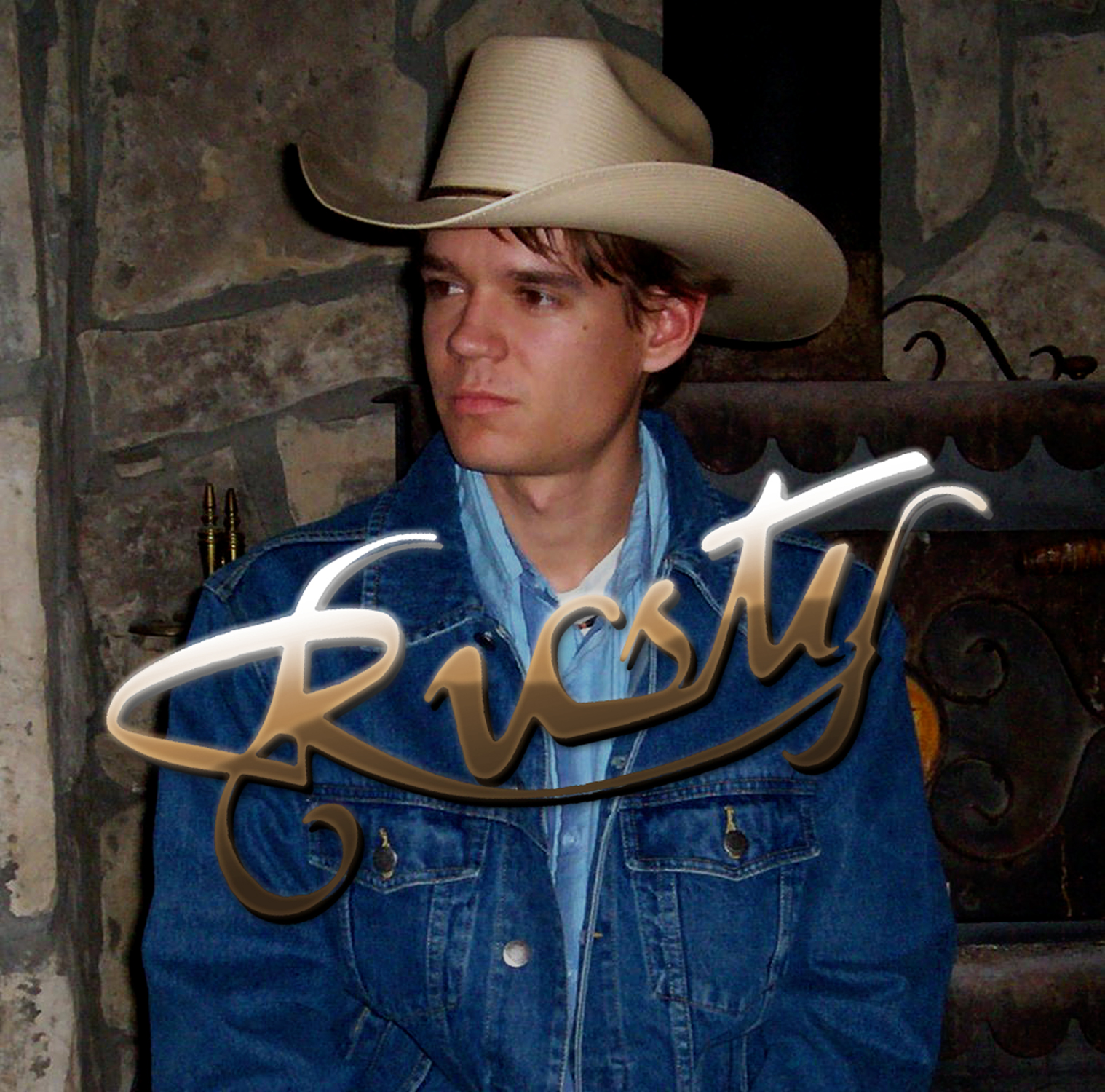
He felt more joy than trepidation approaching the mic. Accustomed to singing in front of crowds since middle school, this agricultural economics junior only saw the supporting faces of family and friends as he began his set.
His first of two original songs, “Till the Fat Lady Sings” drew the crowd in right away. The song follows a young man in love with an unavailable, engaged young woman. The young man promises to pursue her to try to change her mind until the fat lady sings: her wedding day.
At the close of the song the six judges from around the state smiled broadly. Then Rusty began his next song, “Those Little Hands,” a simple, loving song Rusty wrote with his cousin about the death of her baby. The song was an appropriate tribute to acknowledge the sadness during the grieving process. Rusty noticed a woman in the front row wiping a tear, and he appreciated the honesty the song communicated.
That afternoon contestants from around the state took their turn on stage hoping to win the $1000 in prize money and move on to the next level, a regional competition comprising of winners from 8 southern and western states. The final stage of the competition will take place in Nashville and features $100,000 in prize money for the winner.
Rusty was impressed by the other artists as they performed and only hoped for the best. A few minutes later his hopes were satisfied as the judges announced him the winner.
“I thought it was pretty amazing I won the contest,” Rusty shared, “My family and friends, people from church, there were so many folks screaming and excited.”
Soft spoken and reserved in person, Rusty was raised on a ranch outside of El Dorado, Kansas and up until a few years ago wouldn’t have pictured himself on the main stage at the state fair.
“I started playing guitar and singing in church. I’m not sure what happened, but three or four years ago doors just began to open for me and I started performing,” Rierson said.
Self-described as refreshing and heartwarming during a performance, Rierson tries to bring as much of himself to a show as possible often intermixing songs he’s written with those of famous artists.
“I like to write and sing songs about my personal feelings or life experiences. I enjoy incorporating cowboy poetry, like Baxter Black with the music. Who doesn’t want to hear about cows beating up a cowboy during a show,” he added with a bashful smile. “Changing it up keeps people’s attention. I also tell a lot of jokes because if people can laugh with you they become part of the performance.”
Rusty’s first win at a competition came from the YF&R Talent Find put on by Farm Bureau Young Farmers and Ranchers in 2005. Since then Rusty has recorded an album and received a bit of radio time on stations in the Wichita area.
When not attending class and studying, Rusty keeps busy practicing and preparing for performances. He fills his weekends with gigs around the Manhattan and Wichita areas and will travel to Austin, Texas, Las Vegas, Nevada, and Acoma, New Mexico this semester.
“If I can make it, I would sign a contract tomorrow,” Rierson said.
However his enthusiasm and love for music is tempered with a level-headed approach.
“It’s hard to get noticed and get the attention and backing you need. So for me there are two possibilities: if music takes off then I’ll pursue it wholeheartedly. If music doesn’t work out for me, then I work for a company in agriculture or maybe pursue graduate school,” Rierson explained.
Ultimately though, no matter where life takes him, the love of music is something that will never leave.
Growing entrepreneurship in city youth
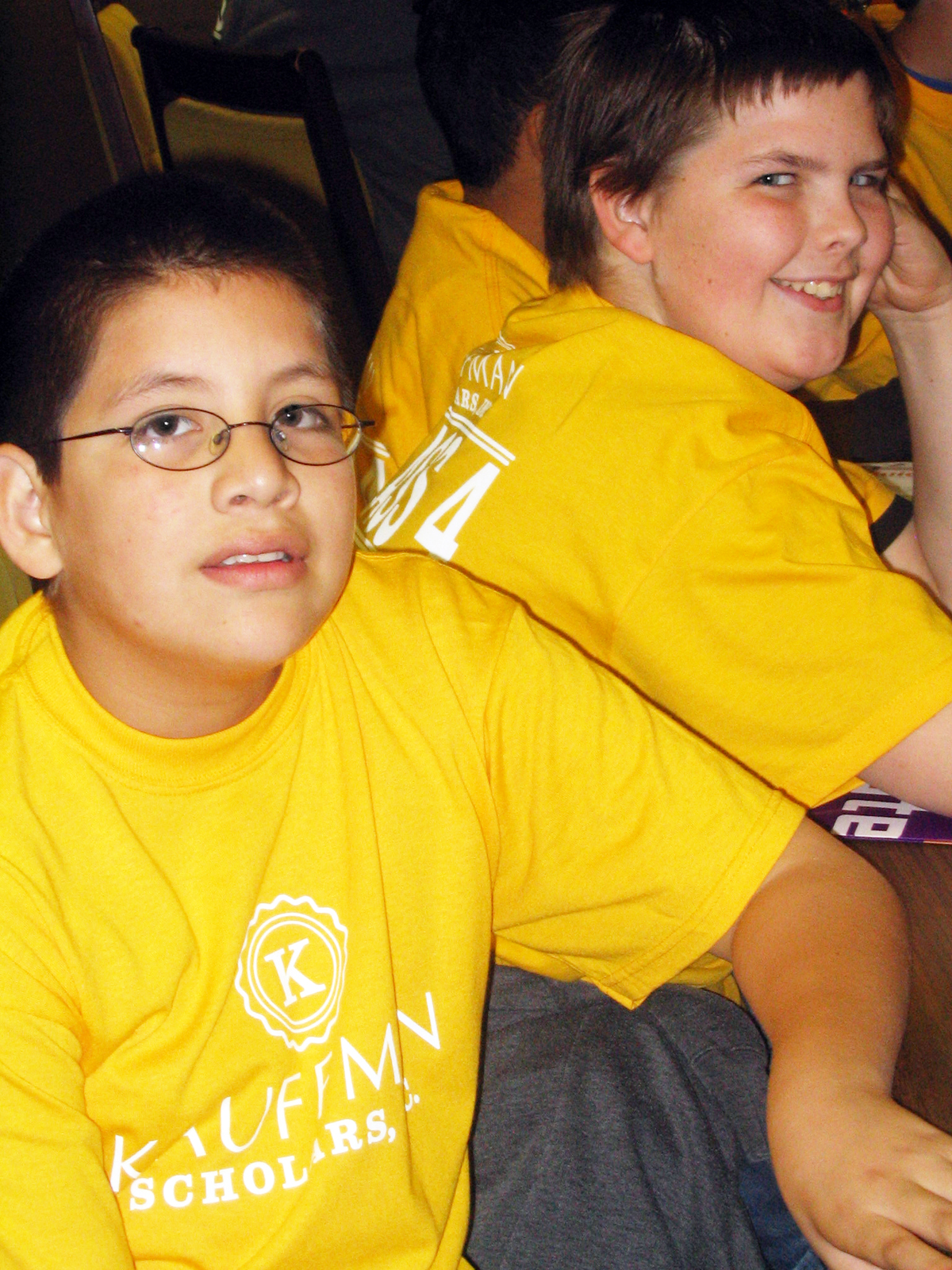 This summer, two faculty members did their share to keep a group of Kansas City area kids on track to successful college careers. Kauffman Scholars visiting K-State during a residential program were encouraged to think about ways to follow their passions through business by Dr. Vincent Amanor-Boadu and Dr. Arlo Biere
This summer, two faculty members did their share to keep a group of Kansas City area kids on track to successful college careers. Kauffman Scholars visiting K-State during a residential program were encouraged to think about ways to follow their passions through business by Dr. Vincent Amanor-Boadu and Dr. Arlo Biere
“Many urban students are unfamiliar with agriculture, so we needed to start with what they knew and then bring them into a discussion about following a passion in their careers -- possibly one in agriculture,” said Amanor-Boadu.
To do that, the faculty used the popular movie October Sky. The movie depicts the true story of Homer Hickam, a coal miner’s son who was inspired by the first Sputnik launch to take up rocketry. The movie follows Homer and his classmates as they attempt to build a rocket against the belief and support of their families and town.
By breaking the movie into topical segments Amanor-Boadu and Biere challenged the students to first think about their passions and dreams.
“I wanted the students to think about moving from being someone who doesn’t care about any activities to someone committed to pursuing a passion. Once they’ve discovered a passion, they can figure out how that dream can work and provide a living for them,” Amanor-Boadu said.
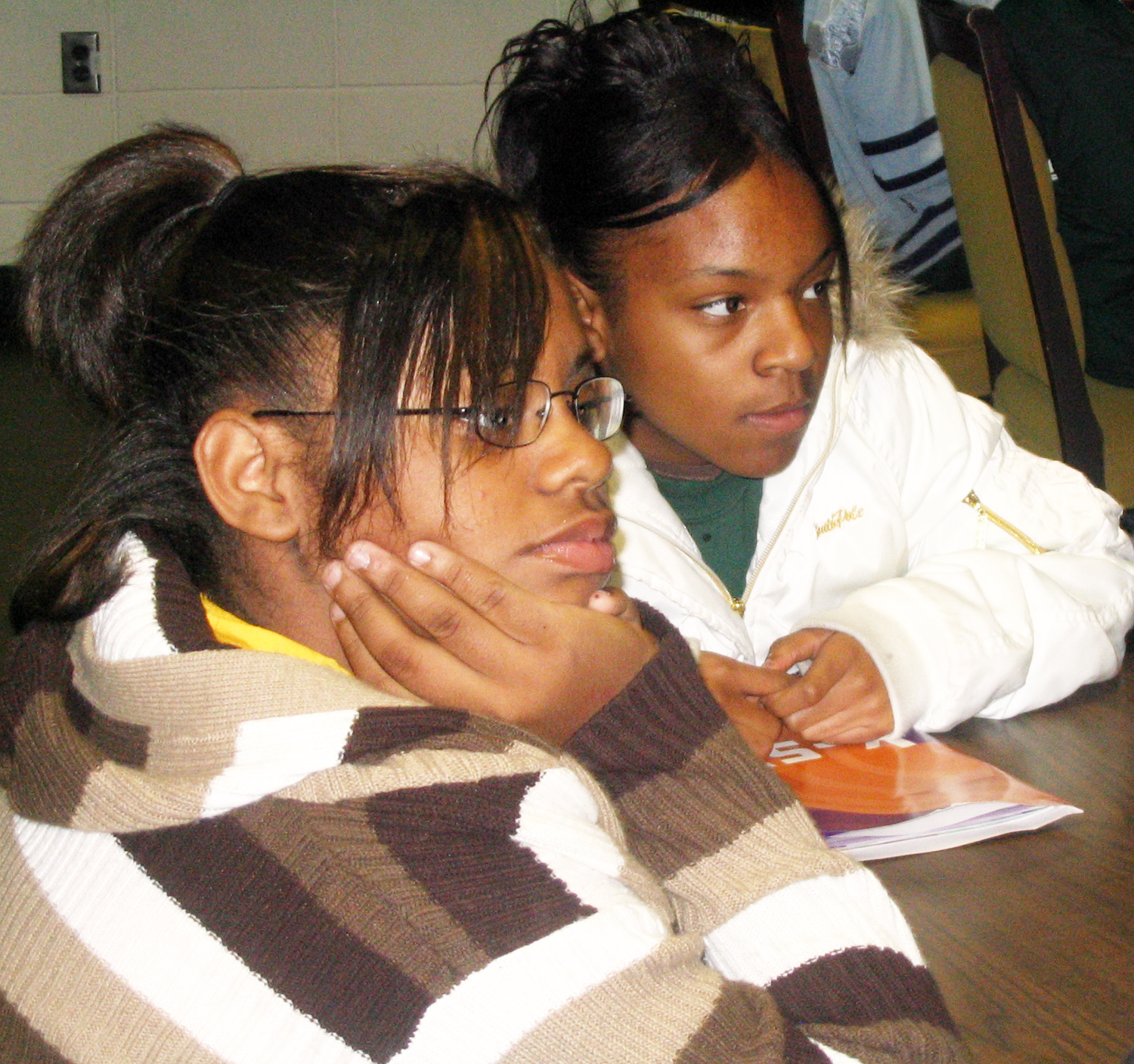 Just as the characters in the movie brought different talents and strengths to building the rocket, Amanor-Boadu believes the students must be resourceful to turn their passions into real opportunities.
Just as the characters in the movie brought different talents and strengths to building the rocket, Amanor-Boadu believes the students must be resourceful to turn their passions into real opportunities.
“My goal was to help them visualize bringing people around them, filling in the missing gaps of an idea, and pursuing the end of a project to fulfill their dreams. These are broad strokes of what we do in agriculture everyday,” Amanor-Boadu said.
The 19-year, $70 million Kauffman Scholars initiative began in 2003. It hopes to assist more than 2,000 low-income students in Kansas City, Kan., and Kansas City, Mo. The Kauffman Scholars program begins in middle school with the goal of preparing urban students to become college graduates, and it continues
to support them through high school and college.
“As a teacher, it is student’s enthusiasm and understanding of the topic that leaves a lasting impression. The Kauffman Scholars are great kids who know the value of the program they are a part of. It was my pleasure to be involved,” Amanor-Boadu said.
Back-to-back national champions
The Kansas State University National Agri-Marketing Association student team won the 2007 National Agri-Marketing Competition, finishing first for the second straight year. The competition, at the National Agri-Marketing Association’s annual conference and trade show, was April 10-12 in Dallas, Texas.
For the competition, students chose a product and developed a plan to successfully bring their product to the marketplace. David Lehman, K-State instructor of marketing and team coach for the competition, said the K-State team developed a marketing plan for a new text messaging service for feedlot owners and managers. The service would provide actionable, timely and accurate market information to aid in marketing decisions when selling cattle.
“We believed in our product and the plan we presented and that showed in our presentation throughout the competition,” said Stacy Mayo, senior in agricultural communications and journalism, Garden City, and a team member. “It was great to come out on top in the end. Many people told us that we couldn’t win two years in a row. We knew if anybody could, this team would.”
Teams from 31 universities participated in the competition, including three teams from Canada. K-State competed against the University of Florida, Sam Houston University, Ohio State University, University of Wisconsin-Platteville and the University of Guelph in the finals.
In addition to winning the marketing competition, the K-State team won the “Best Product” award. Two K-State students also were chosen for scholarships awarded at the conference.
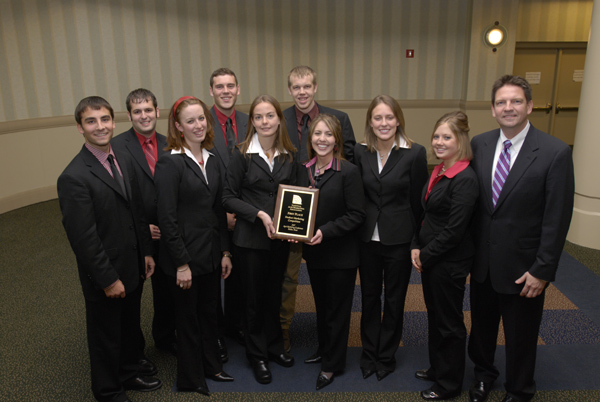 Along with Mayo, K-State participants included: Katie Morris, senior in agribusiness, Arkansas City; Jeff Pio, junior in agribusiness, Edgerton. From Franklin: Vincent Hofer, junior in agribusiness, $2,500 National Agri-Marketing Association scholarship recipient, and David Widmar, junior in agricultural economics, $1,000 National Agri-Marketing Association scholarship recipient. Sarah Coover, senior in agribusiness, Galesburg; Annie Whitehill, senior in agricultural communications and journalism, Latham; and Sam Selee, senior in agribusiness, Manhattan. From out-of-state: Chelsea Good, senior in agricultural communications and journalism, Parker, Colo.; and Jen Albrecht, junior in agricultural economics, North Platte, Neb.
Along with Mayo, K-State participants included: Katie Morris, senior in agribusiness, Arkansas City; Jeff Pio, junior in agribusiness, Edgerton. From Franklin: Vincent Hofer, junior in agribusiness, $2,500 National Agri-Marketing Association scholarship recipient, and David Widmar, junior in agricultural economics, $1,000 National Agri-Marketing Association scholarship recipient. Sarah Coover, senior in agribusiness, Galesburg; Annie Whitehill, senior in agricultural communications and journalism, Latham; and Sam Selee, senior in agribusiness, Manhattan. From out-of-state: Chelsea Good, senior in agricultural communications and journalism, Parker, Colo.; and Jen Albrecht, junior in agricultural economics, North Platte, Neb.
The National Agri-Marketing Association was formed in 1957 and serves the food and fiber industry, focusing on members’ professional development by providing access to solutions and opportunities in agribusiness.
Faculty investigate benefits/costs of NAIS
When the U.S. Department of Agriculture’s Animal and Plant Health Inspection Service needed to take a serious look at animal identification systems, they came to experts at Kansas State University.
In August, K-State researchers received a $499,462 grant to determine the benefits and costs of electronic animal identification systems, which includes the impact of these systems on livestock disease management.
Though the United States has had relatively limited exposure to any severe livestock disease, an increasingly global society and heightened bioterrorism threat make an outbreak more probable. Over the past couple of years alone, foot-and-mouth disease has broken out in 17 countries, according to Ted Schroeder, a K-State professor of agricultural economics and principal investigator on the project.
While there have been no cases of foot-and-mouth disease in the U.S., bovine spongiform encephalopathy disease -- sometimes referred to as mad cow disease -- did make its way into the U.S. cattle herd recently. It was enough to give researchers a glimpse at the consequences of livestock disease. In one of the three recent U.S. cases, the infected cow could not be traced. All that was known was her terminal location, approximate age and breed mixture. An animal ID system would have shown officials where she had been and could have led to more thorough surveillance and testing of other potentially exposed animals.
“Currently the U.S. is battling several contagious animal diseases, such as bovine tuberculosis,” Schroeder said. “Disease outbreaks cause economic hardship on producers, they cost taxpayers when the government has to intervene, and result in the loss of market access for food products.”
The animal identification systems study is an outgrowth of prior work by Schroeder and a team of agricultural economists that predicted as much as a $945 million economic impact in Kansas if foot-and-mouth disease was intentionally introduced into a handful of large-scale cattle operations in the state. If there were an outbreak today, animals that likely had direct contact with the disease would be stamped out. This translates into big economic losses for producers and consumers, Schroeder said.
Schroeder predicts that widespread implementation of an animal ID system would substantially reduce those losses.
“If animal trace-backs were 90 percent successful within 24 hours, total producer and consumer welfare losses would be expected to be nearly 40 percent less than with current animal identification methods,” Schroeder said. However, the voluntary nature of the existing national animal ID program has translated into low levels of participation, Schroeder said.
The study will look at how expensive such tracking systems are and will attempt to quantify the benefits. At K-State, Schroeder is also working with Dale Blasi, professor of animal sciences and industry; Kevin Dhuyvetter, professor of agricultural economics; and Jeri Stroade, Extension assistant in agricultural economics. Researchers from Colorado State University, Montana State University and Michigan State University are also involved. The study’s results will be released in 2008.
Alumni Updates
Wilbur Levering, ‘49
Retired from banking in 1987. Spends time fishing, hunting and farming near Topeka, Kansas.
Jack Hayward, ‘51
Earned his M.A. degree in Counseling in August 2006. Currently resides in Canyon, Texas.
Walter Zurfluh, ‘50 & M.S. ‘52
In February 2007 celebrated working 36 years as missionaries in Eastern Europe and Russia. Currently resides in Pasadena, California
Leon Sucht, ‘60
Retired after 37 years in the banking industry in agricultural areas of California. Currently resides in Manteca, California with wife Elizabeth (Grimble) Sucht.
Larry Kepley, M.S. ‘61
Certified wheat seed producer and sales of hard white wheat in Ulysses, Kansas. Currently serving as Kansas Wheat Commissioner, Chair of National White Wheat Committee, Member of Farmer Direct Milling, and Southwest Kansas Farm Credit Board.
Donald Haberer, ‘62 & M.S. ‘64
Retired farmer and semi-retired appraiser and real estate broker in Russell, Kansas.
Greg Brenneman, ‘71
Marketing manager for Great Plains Manufacturing in Salina, Kansas. Also Co-owner of a cow/calf and grain operation.
Albert Winkler, ‘72
Owns livestock operation in Corning, Kansas
Jerry Meng, ‘73
Vice President at Home State Bank in McPherson, Kansas. Married to Susan, daughter, Melissa and son, Brycen, (currently KSU senior in golf course management).
Neal Farmer, ‘75
Promoted to senior vice president at UMB Bank in Manhattan, Kansas.
Dennis Voboril, M.S. ‘89
Working as a Foreign Service Officer with the Foreign Agricultural Service, U.S. Dept. of Agriculture. Currently working at the U.S. Embassy-Manila. Previous postings with FAS were in Seoul, Korea and Jakarta, Indonesia in addition to Washington, D.C.
Kurt David MAB ‘00
Now chief financial officer for Eagle Communications in Hays, Kansas.
Kimy Nash, ‘01
Kimy and her husband, Jared, of Manhattan, Kansas welcomed Carter Lane Nash in October 2006.
Doug Claussen, MAB ‘02
Took position as President/General manager at Decatur Co-op Association. DCA has seven locations in Northwest Kansas.
Eliana Cobos, MAB ‘04
Now international sales manager for The Exotic Blends Company in Quito, Ecuador.
Randy Dalinghaus, MAB ‘04
Promoted to General Manager and transfered to a Denison, Iowa facility for Farmland Foods.
Mike Scherer, ‘04
Currently working as Crop Insurance Service Representative for Farm Risk Management Specialists in Atchison, Kansas.
Alana Nichols, MAB ‘05
Accepted position with University of Georgia as an agricultural specialist in Tifton, Georgia.
Marilyn Vass, MAB ‘05
Now accounts manager with Kearny County Hospital in Lakin, Kansas.
Melissa Frick, MAB ‘06
Announced her engagement to Jim Gomez. A wedding in planned for 2007.
Cameron Nightingale, MAB ‘06
Left his position at Alltech and has joined Cargill Animal Nutrition as a dairy consultant.
Mark Winger, MAB ‘06
Promoted to senior vice president of administration for Farm Credit of Western Kansas. Elected to four-year term on the Board of Trustees for Colby Community College.
Michelle (Evosovich) Adams, MAB ‘06
Announces with her husband, Rich, the birth of a daughter, Kylee Marie.
Sandra Alton, MAB ‘06
Began new position as member services representative with Gay Lea Foods in Ontario.
![]()
Welcome to the NAIBERhood
The North American beef industry faces a large number of issues that challenge its long-run viability. At the heart of every major issue confronting the livestock and beef industry are economic implications associated with alternative policy and industry management strategies. Being prepared with sound information and knowledge to better understand issues and consequences of various alternatives is essential to address evolving industry issues. NAIBER is an economic research institute that has been established to address these complex issues by faculty member, Ted Schroeder. The overall purpose of the new institute is to serve as a center for knowledge discovery and information dissemination on critical economic issues facing the North American beef industry.
CURRENT NAIBER RESEARCH
Livestock Identification: Lessons for the U.S. Beef Industry from the Australia System
Australia’s animal ID system is mandatory for cattle. We reviewed its implementation and develop a set of recommendations for the national animal identification in the US beef herd.
Consumer Risk Perceptions and Attitudes about Beef Food Safety: Implications for Improving Supply Chain Management
A recent survey about beef food safety concerns of consumers in US, Canada, Japan, and Mexico reveals important beef supply chain participants from producers through retailers and food service institutions. Furthermore, differences across cultures reveals different supply chain management strategies are needed for different target markets.
Considerable research has investigated captive supply impacts in the US. This study draws what we know about impacts in US and compares and contrasts with what might be relevant for Canada and identifies important researchable topics related to Canada-US fed cattle basis and price discovery issues.
View these articles and explore NAIBER initiatives at www.naiber.org.

